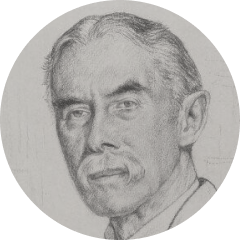A. E. Housman
(1859–1936)
A. E. Housman (1859–1936), poet and classical scholar; Fellow of Trinity College, Cambridge. He attended TSE’s Clark Lectures in 1926, having declined to give the series himself – though it has been reported that TSE observed (from the lectern) that Housman assumed ‘a face so impassive that he had no idea whether or not Housman had approved’ (Hugh Lloyd Jones, London Review of Books, 22 Nov. 1979). According to George Watson, all the evidence points to the conclusion that Housman, who held a romantic view of poetry, disliked Eliot’s arguments (‘Eliot in Cambridge’, Never Ones for Theory?, 46–9). Two years later, Housman was ready to criticise what he called ‘the ignorance of Mr Eliot’ concerning the meaning of Shelley’s ‘Ode to a Skylark’: ‘the silver sphere is the Morning Star, the planet Venus; and Shelley is giving a true description and using an apt comparison’ (letter to the Editor of The Times, ca. 13 Dec. 1928; The Letters of A. E. Housman, ed. Archie Burnett (2007), II, 97). TSE seemed to take no offence: he was to send Housman an advance copy of Journey of the Magi inscribed ‘A. E. Housman respectful homage of T. S. Eliot 17. 8. 27’: see Schuchard, ‘Editor’s Introduction’, Varieties of Metaphysical Poetry, 29–30.
When Muriel St Clare Byrne proposed in 1931 to submit to the Criterion an article that was critical of A Shropshire Lad, TSE responded:
‘Housman was certainly a great influence twenty or thirty years ago, and I only just escaped his influence myself, but at the present day I feel that so far as The Criterion is concerned, he ought to be left to as tranquil an old age as he is capable of enjoying in the cloisters of Trinity. I hope I am not unduly affected by the fact that he has always been very pleasant to me and that I have found him a delightful person in conversation, but I do feel that it would be rather going out of our way to criticize him now’ (7 Apr. 1931).
